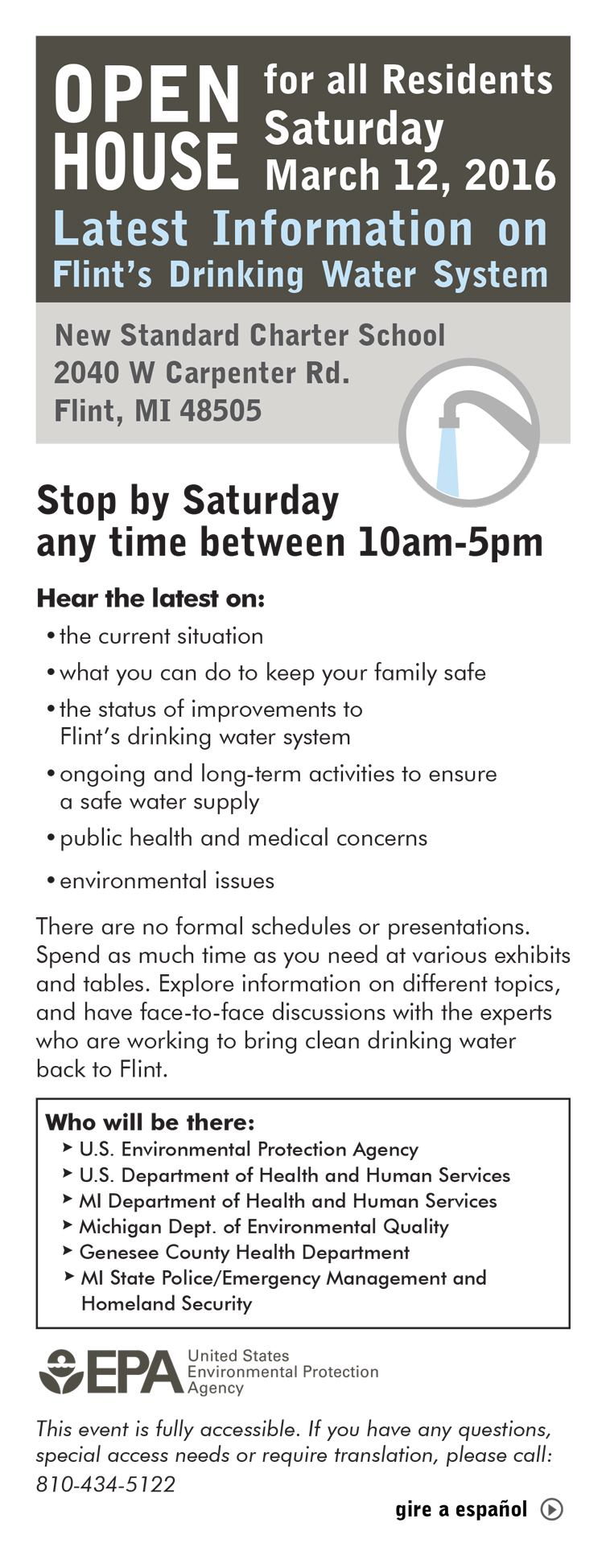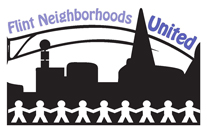This is the daily 2-1-1 summary on the Flint Water Response for Tuesday, March 8, 2016
GENERAL INFORMATION
- GST Michigan Works! is accepting applications for water distribution positions. All positions are paid work experience employment opportunities which will be offered as part of qualified jobseeker’s participation in a federally funded program. Visit gstmiworks.org/hotjobs for job postings, or follow on Twitter @GSTJOBS and Facebook/GSTMIWORKS. All positions be posted on the Pure Michigan Talent Connect at www.mitalent.org. Postings are available in the Employment Services area of GST Michigan Works! located at 711 North Saginaw St. in Flint.
- The Community Partners Mental Health Workgroup provided the following meeting information on meetings of several subgroups:
- FCRG Data & Gap Analysis Workgroup is holding weekly meetings on Thursdays from 1:30 pm – 2:30 pm at the Genesee Health System Board Room.
- FCRG Planning & Coordination Workgroup will meet every other week beginning Wednesday, March 9th, from 10:30 am – 12:00pm at the Genesee Health System Board Room.
- FCRG Faith workgroup will meet on Thursday, March 10, 2016 from 11:30 am – 1 pm at Genesee Health System, 5th Floor.
- FCRG Stress Management Workgroup, will meet every other week on Wednesdays beginning March 16th, from 12:00 pm -1:00 pm at Genesee Health System 4th Floor Conference. Room.
- FCRG Outreach to Special and Vulnerable Populations is meeting on-line via email. To become part of this workgroup please email rkeswick@genhs.org
- FCRG Psychological First Aid (PFA) will schedule a meeting soon. For more information please email nkirsch@genhs.org
- Expanding urban gardening efforts in Flint residents to increase access to healthy food by addressing historic soil lead risks is the focus of a grant from the Michigan Department of Agriculture and Rural Development (MDARD) to the Michigan Food and Farming Systems (MIFFS). The MIFFS Food & Farming Facilitation Team and Edible Flint will lead this effort in partnership with several local organizations. For more information contact MIFFS at 517-432-0712 or miffs.org<http://www.miffs.org.
- The Community Partners Communications Workgroup requested additional information on safe gardening practices to disseminate this information to the community.
NOTE: Given the interest expressed gardening expressed by residents, Michigan 2-1-1 strongly urges that all information about safe gardening practices be translated into Spanish and other needed languages, as well as American Sign Language videos, and braille.
- The Community Partners Communications Workgroup requested additional information on safe gardening practices to disseminate this information to the community.
- Flint Neighborhoods United is holding a community meeting, “Today and Tomorrow – Water in Flint” on Thursday, March 10 from 5:30 pm – 7:30 pm at the Flint Public Library. This is an information meeting with a panel discussion. Residents are asked to submit questions for the panel prior to the meeting by email at fnucommunications@gmail.com.
- There will be an Open House for residents with the latest information on Flint’s Drinking Water System on Saturday, March 12 between 10:00 am-5:00 pm at New Standard Charter School, 2040 W Carpenter Rd., Flint, MI 48505. There are no formal schedules or presentations, but there will be experts to answer questions from EPA, USDHHS, MDHHS, MDEQ, Genesee Health Department and more. See the attached flyer for more information. Véase el folleto adjunto para información en español.
CALL VOLUME
Call summary for the week of February 29 – March 26
The total number of calls from Flint and Genesee County residents continued a modest decline in the past week, which is mirrored by an annual lull in overall 2-1-1 demand that traditionally occurs following a spike in call volume at the beginning of tax season. If the usual call pattern holds true, we anticipate an increase in overall calls from late March through Tax Day.
- 542 callers used the Flint Water prompt to reach a 2-1-1 agent. This is a decrease from 583 callers the previous week. Flint Water calls accounted for 7.6% of the 7137 calls to 2-1-1 last week. For context, the City of Flint is roughly 1% of the state’s population.
- 911 Genesee County residents called 2-1-1, down from 964 a week ago.
- 721 referrals were provided, down from 780 the previous week. The average number of referrals per call (1.3) remained unchanged.
- 7 calls were to donate or volunteer – 1.3% of Flint-related calls,
- There were 25 unmet needs, another significant decrease from 36 unmet needs last week and a 50% drop in two weeks. The percentage of unmet remained unchanged at 4.6%. 18 of the 25 unmet needs were for shower filters.
SPECIAL NEEDS/REQUESTS
CAN SEOC OR THE GOVERNOR’S OFFICE PLEASE ASSIST WITH A RESPONSE TO THE FOLLOWING COMMUNITY REQUESTS:
- The Community Partners Communications Workgroup is asking for guidance from the State of Michigan on the following issues:
- What affects does heat/time have on the plastic water bottles?
- Regarding the side-effects of lead: On average how soon do symptoms appear?
- Who is testing the samples provided by residents? Is more than just lead and coper levels being tested? If so what is being tested?
- Will lead be passed on to recipients that received blood, organs or plasma from Flint donors?
- The Communications Workgroup requested a diagram or org chart of the crisis response mechanism and how all parties work together, including JIC, EOC, SECO, UCG,CHECC, ACE, CDC, EPA, DEQ, HHS, DHHS, FEMA.
- The Communications Workgroup requested coordination by state, federal and local governments on the distribution of information related to the Flint Water situation and the response, emphasizing the community doesn’t want multiple information documents for every department. They are asking for one consistent document on key issues and a mechanism to provide feedback to government entities prior to releasing information.
RUMOR/SCAM CONTROL
- FALSE RUMOR: 2-1-1 received several calls today about a rumor that shower filters were being distributed at one of the fire station water distribution sites. Investigation determined this rumor was not true and callers received a follow up response from 2-1-1 to verify shower filters are not available at these locations.
- A caller reported receiving a postcard from Meridian Health referring them to 2-1-1 for assistance. 2-1-1 is unaware of this mailing. Please contact 2-1-1 at tpage@uwmich.org if you have any information about this mailing.
- The Attorney General’s Office investigates reports of potential scams. These can be reported to the Charitable Trust Section at ct_email@michigan.gov. The AG has tips on how to avoid falling victim to con artists at http://www.michigan.gov/ag/0,4534,7-164-17337_20942-375279–,00.html.
UNRESOLVED
- From 2/29/16: The City of Flint Water Plant can no handle water sample pick-up/drop-off for homebound residents due to increasing demand. 2-1-1 is coordinating with the Water Plant to identify another option for serving these residents and will provide updates until we confirm a solution. In the meantime, please do not refer homebound callers to the Water Plant for assistance. Have them call 2-1-1.
- Related Issue: The form distributed with water testing sample bottles still states that samples must be returned to either City Hall or the Water Plant.
THIS NO LONGER CORRECT. WATER SAMPLE BOTTLES MAY BE RETURNED TO ANY OF THE FIRE STATION WATER RESOURCE DISTRIBUTION SITES.
- Related Issue: The form distributed with water testing sample bottles still states that samples must be returned to either City Hall or the Water Plant.
- From 3/3/16: CAN FLINT WATER DEPARTMENT OR ANOTHER PARTNER CONTACT 2-1-1 WITH INFORMATION ON THE PROCESS FOR FORMER RESIDENTS TO RECEIVE A WATER BILL CREDIT?
- From 3/3/16: Seeking guidance on managing open wounds following recent surgery/injury. A few callers have contacted 2-1-1 asking about the safety of using Flint water to clean open wounds. 2-1-1 is telling these callers to contact their physician and advise using bottled water to cleanse wounds unless advised otherwise.
RESOLUTION: Dr. Jevon McFadden, Medical Epidemiologist at MDHHS and CDC Career Epidemiology Field Officer, provided the following statement, “I would have 2-1-1 emphasize with callers they should always follow their doctor’s guidance with any wound care. Different types of wounds require different methods of care including how and when to clean them. If a caller has been instructed by their doctor to clean their wound with water, and they don’t know what type of water to use, they should be instructed to contact their doctor for clarification. Minor cuts or scrapes not requiring medical attention may be cleaned with tap or bottled water, but if a caller is unsure they should contact their doctor.”
Thank you to MDHHS/Bureau of EMS, Trauma and Preparedness for tracking down this guidance. - From 3/5/16: Residents are asking if it is safe to use tap water in humidifiers. Flint Water Department has received several calls expressing concern about breathing aerosolized water contaminated with lead.
RESOLUTION: MDHHS Subject Matter Experts state, “Portable room humidifiers are known to generate aerosolized water particles that can then be inhaled. Use of tap water in portable room humidifiers is strongly discouraged because it can lead to mineralized deposit build up, which promotes bacterial growth. This may result in dispersal of minerals and bacteria into the humidified air, which can then be inhaled. Portable room humidifiers should always be used according to manufacturer guidance. Always use distilled or demineralized water to fill humidifier tanks. Tap water (whether filtered or unfiltered) is not generally demineralized and should not be used in room humidifiers. Humidifiers should be emptied daily and cleaned regularly to avoid buildup of mineral deposits or films where bacteria and other organisms can grow. Humidifier filters should be replaced regularly, according to manufacturer guidance. Individuals with asthma, allergies, and other chronic medical conditions should first talk to their doctor before using a humidifier.” - From 3/5/16: SEOC received reports of problems dialing 2-1-1 on Lifeline cell phones (aka Obamaphones). Investigation revealed there could be an issue for Boost, TRACPhone or MetroPCS customers making calls on the T-Mobile cellular network. T-Mobile was immediately responsive and is working with Michigan 2-1-1 to determine if there is any problem translating the 2-1-1 abbreviated dialing code to the standard toll-free line.
If you hear of any caller having difficulty reaching 2-1-1, please ask them to report the number of the cell phone used, the time and location where they were calling to tpage@uwmich.org.
REMINDER: Anyone having trouble dialing 2-1-1 in-state, or trying to contact Michigan 2-1-1 from anywhere in the U.S. can connect to an agent by calling our toll-free number at 1-844-875-9211.
RESOLUTION: 2-1-1 has not received any further reports of pay-as-you-go or Lifeline phone users on the T-Mobile network having problems dialing 2-1-1 in Flint. During the course of this investigation Michigan 2-1-1 learned that the T-Mobile has not enabled the 2-1-1 dialing code in several counties across the state. T-Mobile and 2-1-1 are working to fix this and all counties with T-Mobile services should be enabled before the end of March.





